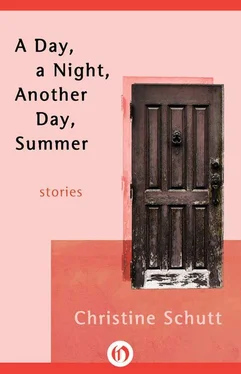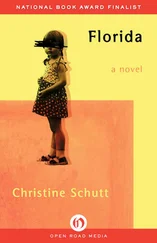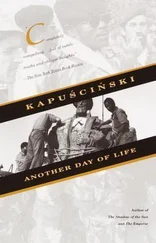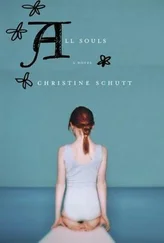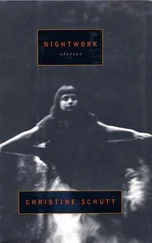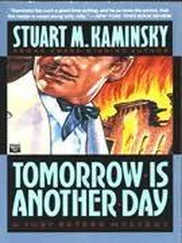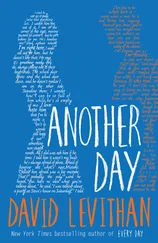Jean was afraid for Jack. Jack was such a baby! Jean was afraid for him when she looked to where he slept in the cinder block facility: two floors, picture windows. B movies, fifties sets, people sashed in bloody curtains were what Jean saw looking up to where Jack lived. The facility had once been something else — a health club, a retreat, a motel? There was the empty swimming pool just beyond the patio — another good spot for a death. Here were crazies who would bite a hand that moved to touch them. And such sounds Jean had heard, lonesome and wild, streaking past Jack when he was on the phone to her and cowled, as she imagined, secretive, shoving off others, saying, “Asshole! I’m talking to my mother!”
“Who is it?” Jean asked.
“No one,” he said. “This kid.”
The sky cleared; the horizon was precise. She asked Ned, “What do you think about Jack? What did you think about what he said? Did you believe him?” Jean asked, “Can someone mix all those drugs and stand?” She asked, “Do you think Jack's any better?”
Ned said, “How should I know? I wasn’t there.”
Home from the beach! The little boys come home! The hair on their heads — matted shocks stuck up in sleep — was warmly fragrant of weeds and sea. Jean had liked to smell the boys. She had bent to their heads and sniffed, but their shirts! Always their shirts smelled worn and unwashed to her — sour, brown.
The beach in noon light was hurtful as foil to look at, and she didn’t.
The beach in any light. In the white folds of Ned’s skin, in the white folds of Jack’s, she had fingered baby sweat. Jean had lifted the wisps of hair from off their baby scalps, marked as the moon, with their stitched plates of bone yet visible, the boys; how often she had thought to break them.
SOMETIMES I SURPRISED MYSELF and went to where my young husband was sitting — and he was often sitting, inky, cross, a writing tablet under his arm — and I went down on my knees. I was between his legs on the night I first met her, the girl of this story; and again when the doorbell rang and rang with our neighbor on the care of the shared garden, I was in his lap.
“Human hair balled in nylons keeps the deer away. Beetles eat the roses, but in this climate everything grows,” our neighbor said.
Molds, I thought of, all kinds of fungus.
Nothing bad had ever happened to me; my father was sending us money, and my young husband and I were grateful. I wrote thank-you notes on heavy cards vined with my initials. I had a new last name and told my young husband, and anyone who asked, that I liked it. I said I had always wanted to be at the end of the alphabet, and this was true, but I was lying when I said I wanted to meet new people. My fantasy was to be crippled enough to be allowed to read in bed all day, yet when I wanted to go to the theater, I could. I bought tickets to a lot of plays and lied about the cost. I lied about money. Sometimes we had less and sometimes more than I reported. But who would have known what cut flowers cost? The tulips were expensive! Common, yes, ordinary, nothing of the wistful about them, nothing poetical, but they were clean and sturdy, and I went on lying about how much flowers cost. I lied about other things, too, sometimes fantastically, even garishly. Any story about where the girl and I went was untruth; I embellished.
Amsterdam for the weekend — not likely!
And what was expected of me?
We were visitors, my young husband and I, and we were ignorant. Should we consider the garden beds our business, too? we wondered. And could we cut the roses, or were we just to mow the grass? Other concerns I had were over dates, rivers, architectural styles; I wanted to know. What was a caryatid, an obelisk, a cataract? I had to look up new words and many of the same words. Pusillanimous was one I could never remember! The girl taught me how to say Magdalen on a day full of histories — this is where and this is where and this is where it happened. Here indeed was an English friend when the brusque wind that was our neighbor smelled of garden. “I am used to,” our neighbor whined on and on, “I am used to.” Water, rake, prune. That garden was all of the time.
Eventually we fought over it, the neighbor and I, but the garden came with the flat as shared. It was shared, yet I was too shy to walk freely in it, and my young husband had other tours in mind.
Alone, arrived at the British Museum, I walked toward the great sooty columns and into the shadowed interior; skirts, I heard, and whisperers scuffling past. Heroines, full of restraint, circled medieval weaponry: Fanny Price and Lucy Snow, commonly known — like the tulips — yet I favored them as heroines. They had integrity, and though I did not, I strove to be better and was inspired by my visits to the manuscript rooms. Seals, documents, signatures — their makers really lived!
I tramped along the Long Water alone, and sometimes my young husband came, too, but what I wanted was a dog. I had some breeds in mind, and we went to kennel shows to see them. We pretended we were buying, or I pretended, and my young husband indulged me. He let me stay to see the setters show off in the ring. He let me coo and calculate the cost. Much too much money!
This is the woman I was then, spoiled, fearful, idolatrous, a mix that our neighbor, I think, recognized. A big box in a car coat, our neighbor stood at the gate to the garden, and I stood at the window looking down at her. We looked at each other for what felt like a long time, unsmiling and curious, seeming to ask, What is it like where you live?
I missed home and I didn’t miss home. I said I could live here forever just to be surrounded by the scribbling ghosts. My young husband was scribbling something. Situated, alert, he quoted E. P. Thompson from The Making of the English Working Class. I quoted some writers, too, a bit more obvious, yes, but love poems: “Now thou hast lov’d me one whole day, Tomorrow when thou leav’st, what wilt thou say?” We took ourselves seriously. We were foolish, but we believed — or I did — that in another country we might take up our work; here, in a place where every third house had its plaque, its honored dead, we might see what we were meant to do, and we might know to do it.
It was all this not knowing. What are you going to do and what are you going to do? At least here were no nearby parents to ask, “What happens now?” We were living far away in a watery country; brush past the shrubbery and it spilled. I loved it, England, yes. Mostly I wanted to be here and not home. The rock walls greened in the fissures, and the terraces were overgrown — woodbine, musk rose, eglantine. Shakespeare’s benevolent spirit. Keats once, alone along Well Walk; but the dead in the galleries were women who had suffered in love — as who had not? — only these women were famous for it. Say anything, teach anything, prove anything, monsieur; I can listen now.
I did not always want to listen to my young husband speak. His voice, I thought, was flat and had no music — and neither did mine, which was reason enough to be quiet. On buses, in taxis, I often put my finger to my lips. After the theater, with the accents in our ears, it was best to be quiet.
The rain made us quiet and kept us indoors with books, and I was happy. I liked reading, and I still liked bringing my young husband off in the fogged winter light. It seemed then that our bodies were English pale and that the rain against the window made rivulets of shadow — did it? Was the night sky I saw quite so pink?
I wasn’t sure.
I wasn’t sure of a lot of things after they had happened.
A new morning, January, Magdalen, the deer park, I was without my young husband and in the girl’s company. The frozen grass was still green, very hard underfoot. My shoes were flimsy and wet, while the girl, I saw, was wearing boots — Wellingtons, of course, why not?
Читать дальше
